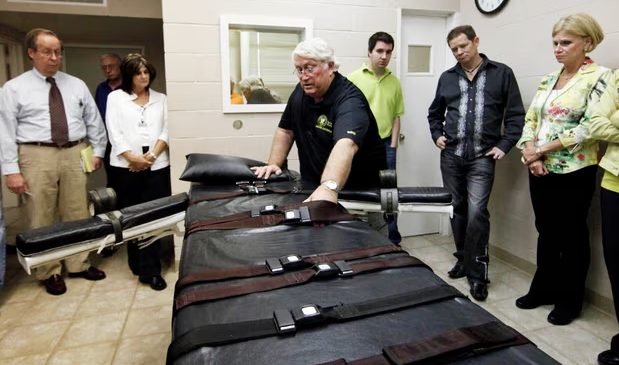LOUISIANA ~ I gave a compelling speech in LSU-Shreveport’s public speaking class in the summer of 1987. Why we should eliminate the death penalty. This was an abstract argument to me then. I never anticipated to face the death penalty. I believed that only happened to others. That truth visited my family in December 2000. The young man who had done my mother’s yardwork for years took her from her house in Plain Dealing, Louisiana, a week before Christmas to seek money for gambling debts and a ride to a nearby town. That evening’s events killed her. Unfathomable loss and suffering plagued my family. Our feelings varied from fury to rage to despair and profound sadness after shock and terror. After telling me they had recovered my mother’s body and arrested the suspect, one of the sheriff’s officers went very close to my ear and said, “Just say the word and he’ll never make it to trial.” My reflex was, “No!” No more violence!”, and my stomach emptied in the front yard.
In complete candor, I briefly thought about torturing the young man who had done this to my mother during a low period. I imagined him tied up as I sliced his body with surgical equipment to hurt him as much as I do. I needed to hear and witness his agony. I wanted him to pay for hurting my mother, me, our family, and our town. Good thing emotions are fleeting. Eternal mercy and grace. Over the years, I’ve realized that these feelings were natural, if disconcerting. When we met the sheriff and prosecutor, we were numb, shocked, and melancholy. Due to the heinousness of this act, we’ll go for the death punishment,” the prosecutor stated. Do you have an issue with that? We were silent. Deadly quiet.
That moment may have been my hardest in the preceding two decades. Where’s my voice? Why was I quiet? My parents, grandparents, aunts, uncles, and religion community taught me Christian principles. What happened? (I now know that a skilled therapist or counselor can help us understand these questions. After grief and shock, our words get trapped and often go unheard.
The 19-year-old who killed my mother was executed in spring 2002. He has spent over half his life on death row at Angola state penitentiary. His name is Jeremiah. I began my emotional and spiritual rehabilitation by learning more about Jeremiah. I have a lot of indirect information about Jeremiah but haven’t met him. Our “system” of death penalty separation keeps people apart. It prevents connection, communication, and healing. I’ve testified before Louisiana legislative committees discussing a death penalty ban in recent years. I fully endorse those efforts. Some politicians aren’t. Their “pro-life” principles have not reached death row inmates.
Governor John Bel Edwards authorized the Board of Pardons to hold death row hearings this summer, making clemency possible. It gives me hope. The Louisiana attorney general, who is running for governor, has been trying to block those hearings for political points in recent weeks. I worry that Jeremiah and the 56 others on death row will be executed without clemency. Jeremiah should not be killed by the state in my or my mother’s name. We rarely hear about “mercy” in court. Mercy is refusing to punish violators despite having the legal right to do so. Mercy is letting go of the impulse to hurt and choosing a healing path. Mercy allows redemption. Mercy liberates victims and criminals. As someone who has felt hell’s fires of fury and revenge, I encourage our state to choose mercy and reparation over killing. Killing Jeremiah will hurt me, my family, Jeremiah’s mother, family, and friends, and society. It’s possible to restore justice.
news from enegxinewss
